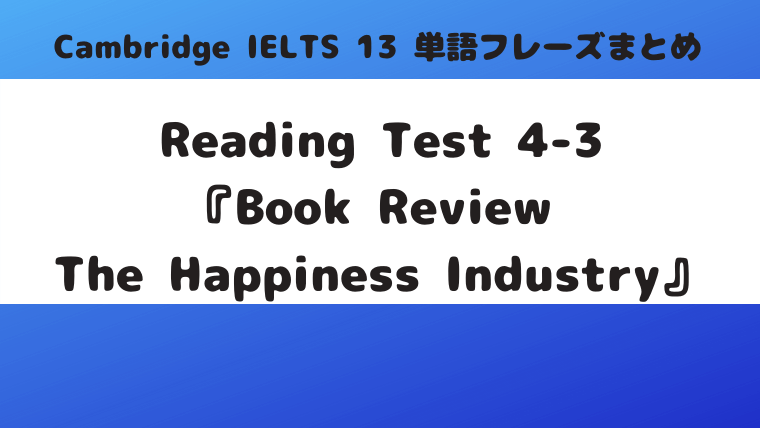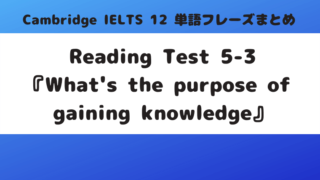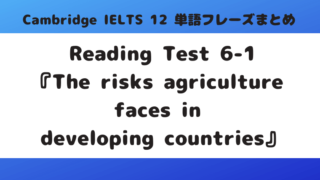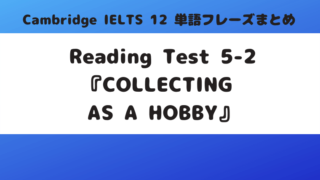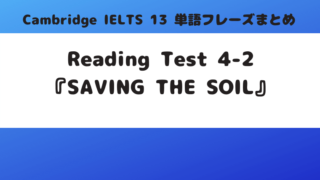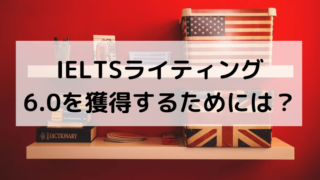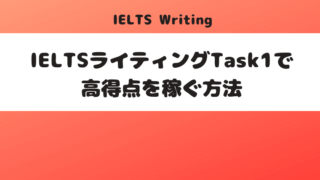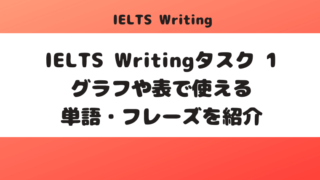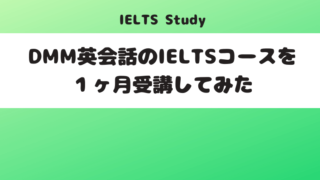「Cambridge IELTS 13」Reading Test4-3『Book Review The Happiness Industry』(p.89)の単語・フレーズをまとめました。
私がIELTS Readingの単語・まとめを行う理由は「Cambridge IELTS Reading単語・フレーズまとめ」からご覧ください。
Reading Test 4 Passage 3:Book Review The Happiness Industry
- ultimate
adjective [ before noun ]
UK /ˈʌl.tɪ.mət/ US /ˈʌl.tə.mət/
most extreme or important because either the original or final, or the best or worst:
1 <目標などが> 最終的な, 究極の
2 <階段などが> 最後の, 最終的な
3 (同種の中で) 最高の, 最良[最悪]の
4 <決定・責任などが> 最終的な, 最高の
5 根本的な, 究極の
(実践IELTS英単語3500:1060) - self-evidently
adverb
UK /ˌselfˈev.ɪ.dənt.li/ US /ˌselfˈev.ə.dənt.li/
in a way that is clear or obvious without needing any proof or explanation
わかりきっているほどに - pronouncement
noun [ C ] formal
UK /prəˈnaʊnsmənt/ US /prəˈnaʊnsmənt/
an official announcement:
〘フォーマル〙 公式発表[声明,見解]
(実践IELTS英単語3500:3233) - advocate
verb [ T ]
UK /ˈæd.və.keɪt/ US /ˈæd.və.keɪt/
to publicly support or suggest an idea, development, or way of doing something:
…を擁護[弁護,支持]する
(実践IELTS英単語3500:2120) - collective
adjective [ before noun ]
UK /kəˈlek.tɪv/ US /kəˈlek.tɪv/
of or shared by every member of a group of people:
集団としての, 集団[全体]的な, 共同の
(実践IELTS英単語3500:1541) - well-being
noun [ U ]
UK /ˌwelˈbiː.ɪŋ/ US /ˌwelˈbiː.ɪŋ/
the state of feeling healthy and happy:
1 幸福, 福利, 健康
2 (国の) 安寧と繁栄 - secure
verb
UK /sɪˈkjʊər/ US /səˈkjʊr/
・to get something, sometimes with difficulty:
・to make certain something is protected from danger or risk:
・to make certain that money that has been lent will be paid back, by giving the person who lends the money the right to own property belonging to the person who borrows it, if the money is not paid back:
・to fasten one object firmly to another:
1 (苦労して) …を手に入れる, 確保する, 確実とする
2 (攻撃・危害などから) …を守る, 安全にする
3 …をしっかり固定する, 結びつける
4 secure somebody’s / something’s future
<…>の将来を確保する
5 <ローン・支払いなど> を保証する - astonishingly
adverb
UK /əˈstɒn.ɪ.ʃɪŋ.li/ US /əˈstɑː.nɪ.ʃɪŋ.li/
in a way that is very surprising:
驚くほど, 驚いたことに
(実践IELTS英単語3500:1999) - crude
adjective
UK /kruːd/ US /kruːd/
simple and not skilfully done or made:
rude and offensive:
1 粗末な, 粗削りな
2 〘けなして〙 無作法な, 下品な, 粗野な
同意 vulgar
3 <尺度・計算などが> 大まかな, だいたいの
同意 rough
4 《名の前でのみ》 (油・ゴムなどが) 天然のままの, 加工[化学処理]されていない
(実践IELTS英単語3500:1653) - simple-minded
adjective disapproving
UK /ˌsɪm.pəlˈmaɪn.dɪd/ US /ˌsɪm.pəlˈmaɪn.dɪd/
A simple-minded person does not have the ability to use reason and understand.
A simple-minded action or opinion is based on a limited understanding of a situation.
1 <人が> 頭の悪い, 単細胞の
2 <考え・行動などが> 単純な, おめでたい - philosophical
adjective
UK /ˌfɪl.əˈsɒf.ɪ.kəl/ US /ˌfɪl.əˈsɑː.fɪ.kəl/
・relating to the study or writing of philosophy:
・If you are philosophical in your reaction to something that is not satisfactory, you accept it calmly and without anger, understanding that failure and disappointment are a part of life.
1 哲学の, 哲学的な
2 冷静な, 平然とした
(実践IELTS英単語3500:2034) - explore
verb [ I or T ]
UK /ɪkˈsplɔːr/ US /ɪkˈsplɔːr/
to search and discover (about something):
to think or talk about something in order to find out more about it:
1 a) 《他》 <未知の地域> を探索[探検]する
b) 《自》 探索[探検]する
2 《他》 <考え・方法など> を検討する, 探る
同意 consider, investigate
3 《他》 〘書き言葉〙 (触感で) …を調べる, 確かめる - question
verb [ T ]
UK /ˈkwes.tʃən/ US /ˈkwes.tʃən/
・to ask a person about something, especially officially:
・to express doubts about the value or truth of something:
1 <人> を取り調べる, 尋問する
2 …に聞き取り[アンケート]調査をする
3 〘特に書き言葉〙 …と質問する, 尋ねる
4 …を疑う, 疑問に思う
5 …が疑問だと言う
(実践IELTS英単語3500:2049) - absence
noun
UK /ˈæb.səns/ US /ˈæb.səns/
・the fact of not being where you are usually expected to be:
・the fact of not existing:
1 《C, U》 不在, 留守, 欠席, 欠勤
2 absence of 《U》 欠如, 欠乏
in the absence of something
<…>がない場合は
(実践IELTS英単語3500:165) - realisation / realization
noun (UK usually realisation)
UK /ˌrɪə.laɪˈzeɪ.ʃən/ US /ˌriː.ə.ləˈzeɪ.ʃən/
・the fact or moment of starting to understand a situation:
・the act or moment of achieving something you planned to do or hoped for:
・the act of getting money by selling something:
1 気づくこと, 理解, 認識, 実感
2 〘書き言葉〙 実現, 達成
realization of
3 〘専門〙 現金化, 換金 - throughout
preposition, adverb
UK /θruːˈaʊt/ US /θruːˈaʊt/
in every part, or during the whole period of time:
前置詞
1 …じゅうに, …の至るところに
2 (期間・行事などについて) …の間ずっと, …の始めから終わりまで
副詞
1 終始, 始めから終わりまで
2 どこも(かしこも), 至るところ
(実践IELTS英単語3500:37) - struggle
verb
UK /ˈstrʌɡ.əl/ US /ˈstrʌɡ.əl/
・to experience difficulty and make a very great effort in order to do something:
・to move somewhere with great effort:
・to be in danger of failing or being defeated:
・to fight, especially with your hands:
・to use a lot of effort to defeat someone, prevent something, or achieve something:
1 struggle to do something
<…>するのに奮闘する
2 (自由になろうとして) もがく, 暴れる, 争う
3 《always + adverb/preposition》 苦労して進む
4 struggle into something
無理に<衣服>を着る
5 (動かそうと) 力を込める
6 (成績が悪く) 苦労する, <国・チームなどが> 不振にあえぐ
(実践IELTS英単語3500:260) - reconcile
verb [ T ]
UK /ˈrek.ən.saɪl/ US /ˈrek.ən.saɪl/
to find a way in which two situations or beliefs that are opposed to each other can agree and exist together:
1 《他》 <2つの異なる考え・状況など> を両立させる, 調和させる
2 a) be reconciled (with somebody)
(<人>と)和解する, 仲直りする
b) 《自》 米 <2人の人が> 和解する, 仲直りする
(実践IELTS英単語3500:1185) - pursuit
noun
UK /pəˈsjuːt/ US /pɚˈsuːt/
・an activity that you spend time doing, usually when you are not working:
・the act of following someone or something to try to catch him, her, or it:
・the act of trying to achieve a plan, activity, or situation, usually over a long period of time:
1 《U》 the pursuit of something
<…>の追求
2 《C, U》 追跡
3 《C通例複数形で》 (スポーツ・趣味などの) 娯楽, 余暇活動
(実践IELTS英単語3500:1185) - metaphysics
noun [ U ]
UK /ˌmet.əˈfɪz.ɪks/ US /ˌmet̬.əˈfɪz.ɪks/
the part of philosophy that is about understanding existence and knowledge
形而上(けいじじょう) 学
形而上学は、感覚ないし経験を超え出でた世界を真実在とし、その世界の普遍的な原理について理性的な思惟によって認識しようとする学問ないし哲学の一分野。 - fiction
noun
UK /ˈfɪk.ʃən/ US /ˈfɪk.ʃən/
the type of book or story that is written about imaginary characters and events and not based on real people and facts:
a false report or statement that you pretend is true:
1 《U》 (集合的に) 小説, フィクション
反意 nonfiction
2 《C, U》 作り話, 絵空事, 虚構, まやかし - conviction
noun
UK /kənˈvɪk.ʃən/ US /kənˈvɪk.ʃən/
・the fact of officially being found to be guilty of a particular crime, or the act of officially finding someone guilty:
・a strong opinion or belief:
・a feeling of being certain about something:
1 《C》 信念, 揺るぎない考え
2 《C》 有罪判決
3 《U》 確信, 自信
4 《U》 有罪の立証
反意 acquittal
(実践IELTS英単語3500:1203) - outmoded
adjective disapproving
UK /ˌaʊtˈməʊ.dɪd/ US /ˌaʊtˈmoʊ.dɪd/
no longer modern, useful, or necessary:
流行[時代]遅れの 同意 outdated - reject
verb [ T ]
UK /rɪˈdʒekt/ US /rɪˈdʒekt/
to refuse to accept, use, or believe something or someone:
to not give someone the love and attention they want and are expecting from you:
1 <計画・提案など> を拒絶する, はねつける, <要求など> を拒む, 却下する
反意 accept
2 <考え・主張など> を否定する, 認めない
3 <人> を不合格[不採用]にする, <出願など> を拒絶する
反意 accept
4 <不良品など> を捨てる, 返す
5 <人> を拒絶する
6 <体が> <移植された臓器など> に拒絶反応を起こす
(実践IELTS英単語3500:685) - irrelevant
adjective
UK /ɪˈrel.ə.vənt/ US /ɪˈrel.ə.vənt/
not related to what is being discussed or considered and therefore not important:
無関係の, 不適切な, 役に立たない - entirety
in its entirety
with all parts included:
1 in its / their entirety
そっくりそのまま, 全部
2 the entirety of something
<…>の全部 - reflection
noun
UK /rɪˈflek.ʃən/ US /rɪˈflek.ʃən/
・the image of something in a mirror or on any reflective surface:
・the return of light, heat, sound, or energy from a surface:
・angle of reflection
the angle that a beam of light or other energy that is reflected from a surface makes with a line vertical to that surface
・a sign or result of something:
・serious and careful thought:
1 《C》 (鏡などに) 映った姿[像,影]
2 《U》 よく考えること, 熟考
3 《C通例複数形で》 考え, 意見
4 《C》 (感情・事実・状態などの) 反映, 表れ
5 《U》 (光・熱の) 反射, (音の) 反響 - self-evident
adjective
UK /ˌselfˈev.ɪ.dənt/ US /ˌselfˈev.ə.dənt/
clear or obvious without needing any proof or explanation:
自明の, わかりきった - inquiry
noun (UK also enquiry)
UK /ɪnˈkwaɪə.ri/ US /ˈɪŋ.kwɚ.i/
・(the process of asking) a question:
・an official process to discover the facts about something bad that has happened:
1 《C》 問い合わせ, 質問
2 《C, U》 (事件・事故などの) 調査, 取り調べ
3 《U》 〘フォーマル〙 調査, 取り調べ - virtue
noun
UK /ˈvɜː.tʃuː/ US /ˈvɝː.tʃuː/
a good moral quality in a person, or the general quality of being morally good:
an advantage or good thing:
1 《C》 美徳
2 《U》 〘フォーマル〙 善行, 徳
反意 wickedness
3 《C, U》 長所, 美点, とりえ
4 《U》 〘やや古〙 貞操, 貞節
(実践IELTS英単語3500:1479) - lucid
adjective
UK /ˈluː.sɪd/ US /ˈluː.sɪd/
clearly expressed and easy to understand, or (of a person) thinking or speaking clearly:
1 明快な, わかりやすい
2 <病人・老人などが> 意識がはっきりした - banknote
noun [ C ] mainly UK
UK /ˈbæŋk.nəʊt/ US /ˈbæŋk.noʊt/
a piece of printed paper that has a particular value as money:
銀行券, 紙幣, 札(さつ) 同意 bill 米, note 英 - provision
noun
UK /prəˈvɪʒ.ən/ US /prəˈvɪʒ.ən/
・the act of providing something:
・supplies of food and other necessary things:
・a statement within an agreement or a law that a particular thing must happen or be done, especially before another can happen or be done:
・in a company’s accounts (= financial records), an amount of money that is kept in case of a possible future loss:
1 《C, U》 (必要品・サービスなどの) 供給, 支給
2 《C, U》 準備, 設備, 備え
3 provisions 《常に複数形で》 (長旅のための) 食糧
4 《C》 (法律・協定などの) 条項, 規定
(実践IELTS英単語3500:1004) - be regards as
とされている - pleasurable
adjective
UK /ˈpleʒ.ər.ə.bəl/ US /ˈpleʒ.ɚ.ə.bəl/
enjoyable:
愉快な, 楽しい, 心地よい
(実践IELTS英単語3500:2810) - sensation
noun
UK /senˈseɪ.ʃən/ US /senˈseɪ.ʃən/
the ability to feel something physically, especially by touching, or a physical feeling that results from this ability:
a general feeling caused by something that happens to you, especially a feeling that you cannot describe exactly:
something very exciting or interesting, or something that causes great excitement or interest:
1 《C, U》 (五感による) 感覚
同意 feeling
2 《C》 (精神的な) 感じ, 感覚
同意 feeling
3 《U》 知覚, 感触
4 《C通例単数形で》 センセーションを巻き起こす人[もの,こと], 注目の的
5 《常に単数形で》 センセーション, 大評判
(実践IELTS英単語3500:720) - quantify
verb [ T ]
UK /ˈkwɒn.tɪ.faɪ/ US /ˈkwɑːn.t̬ə.faɪ/
to measure or judge the size or amount of something:
…を数量化する, 数値で表す
(実践IELTS英単語3500:3075) - pulse rate
脈拍数 - quantification
noun [ U ]
UK /ˌkwɒn.tɪ.fɪˈkeɪ.ʃən/ US /ˌkwɑːn.t̬ə.fəˈkeɪ.ʃən/
the act of measuring or judging the size or amount of something:
定量化、数量化 - latter
adjective [ before noun ]
UK /ˈlæt.ər/ US /ˈlæt̬.ɚ/
near or towards the end of something:
1 (二者のうちの) 後者の, あとの
2 (時間的に) 終わりごろの, 末期の
(実践IELTS英単語3500:94) - entangle
verb [ T usually passive ]
UK /ɪnˈtæŋ.ɡəl/ US /ɪnˈtæŋ.ɡəl/
to cause something to become caught in something such as a net or ropes:
1 (網などに) …を引っかける, 絡ませる
2 (面倒な状況に) <人> を巻き込む
(実践IELTS英単語3500:2999) - integral
adjective
UK /ˈɪn.tɪ.ɡrəl/ US /ˈɪn.t̬ə.ɡrəl/
・necessary and important as a part of a whole:
・contained within something; not separate:
1 an integral part of something
<…>に不可欠な部分
2 《名の前でのみ》 英 〘フォーマル〙 一体化した
3 《名の前でのみ》 〘専門〙 整数の
(実践IELTS英単語3500:2041) - capitalism
noun [ U ] POLITICS
UK /ˈkæp.ɪ.təl.ɪ.zəm/ US /ˈkæp.ə.t̬əl.ɪ.zəm/
an economic, political, and social system in which property, business, and industry are privately owned, directed towards making the greatest possible profits for successful organizations and people
資本主義 - redefine
verb [ T ]
UK /ˌriː.dɪˈfaɪn/ US /ˌriː.dɪˈfaɪn/
to change the meaning of something or to make people think about something in a new or different way:
…を規定し直す, 再定義する - malady
noun [ C ] formal
UK /ˈmæl.ə.di/ US /ˈmæl.ə.di/
a disease
a problem within a system or organization:
1 〘フォーマル〙 (社会・組織内の) 弊害, 病弊
2 〘やや古〙 病気 - tendency
noun [ C ]
UK /ˈten.dən.si/ US /ˈten.dən.si/
・If someone has a tendency to do or like something, they will probably do it or like it:
・If there is a tendency for something to happen, it is likely to happen or it often happens:
・If there is a tendency to do something, it starts to happen more often or starts to increase:
1 (ある特定の) 傾向, 性質
2 (一般的な) 傾向, 風潮, 趨勢(すうせい)
同意 trend
3 英 (政党内の) 反主流派, 急進派
(実践IELTS英単語3500:421) - sharpen
verb [ T ]
UK /ˈʃɑː.pən/ US /ˈʃɑːr.pən/
to make something sharp or sharper:
to make something stronger:
to improve:
to make something clearer:
to make something play a higher musical note:
1 《他》 …を鋭くする, <鉛筆> を削る, <ナイフ・包丁> を研ぐ
2 《他》 (sharpen something <> up とも) <技能など>を磨く
同意 improve
3 《他》 <興味・感情など> をつのらす, 強くする
4 a) 《他》 <画像・映像など> を鮮明にする b) 《自》 鮮明になる
5 a) 《自》 〘文〙 <声が> かん高くなる b) 《他》 〘文〙 (怒り・いらいらなどで) <声> をかん高く張り上げる - factual
adjective
UK /ˈfæk.tʃu.əl/ US /ˈfæk.tʃu.əl/
using or consisting of facts:
事実に基づく
(実践IELTS英単語3500:2142) - confine
verb
UK /kənˈfaɪn/ US /kənˈfaɪn/
・to limit an activity, person, or problem in some way:
・to keep someone closed in a place, often by force:
《名の前でのみ》 狭い, 限られた
(実践IELTS英単語3500:1908) - reductive
adjective formal
UK /rɪˈdʌk.tɪv/ US /rɪˈdʌk.tɪv/
considering or presenting something in a simple way, especially a way that is too simple:
還元的な、還元性の - pedigree
noun
UK /ˈped.ɪ.ɡriː/ US /ˈped.ə.ɡriː/
・a list of the parents and other relations of an animal:
・a person’s family history, education, and experience, or the history of an idea or activity:
1 系統, 血筋 同意 background
2 《C, U》 (上流家庭の) 家系
3 《C, U》 (犬・馬などの) 血統, 血統書
4 《C》 純血種の動物→ crossbreed, mongrel
(実践IELTS英単語3500:2751)
